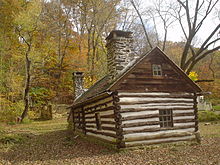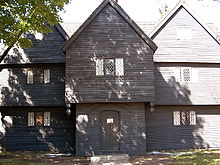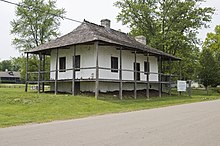American colonial architecture


American colonial architecture includes several building design styles associated with the
These styles are associated with the houses, churches and government buildings of the period from about 1600 through the 19th century.Several relatively distinct regional styles of colonial architecture are recognized in the United States. Building styles in the 13 colonies were influenced by techniques and styles from England, as well as traditions brought by settlers from other parts of Europe. In
Early buildings in some other areas of the United States reflect the architectural traditions of the colonial powers that controlled these regions. The architectural style of Louisiana is identified as French colonial, while the Spanish colonial style evokes Renaissance and Baroque styles of Spain and Mexico; in the United States it is found in Florida, Louisiana, New Mexico, Texas, Arizona, and California.[4]
Subtypes
First Period is a designation given to building styles used in the earliest English settlements at Jamestown, Virginia (1607), and Plymouth, Massachusetts (1620), and later in the other British colonies along the Eastern seaboard.
These buildings typically included as steep roofs, small casement leaded glass windows (usually due to a scarcity of glass in the colonies), rich ornamentation (in the more expensive house only) and a massive central chimney.
French Colonial

Developed in French-settled areas of North America beginning with the founding of Quebec in 1608 and New Orleans, Louisiana, in 1718, as well as along the Mississippi River valley to Missouri.
The early French Colonial house type of the Mississippi River Valley region was the poteaux-en-terre, constructed of heavy upright cedar logs set vertically into the ground. These basic houses featured double-pitched hipped roofs and were surrounded by porches (galleries) to handle the hot summer climate.
By 1770, the basic French Colonial house form evolved into the briquette-entre-poteaux (small bricks between posts) style familiar in the historic areas of New Orleans and other areas. These homes featured double-louvred doors, flared hip roofs, dormers, and shutters.[5]
Spanish Colonial

Developed with the earlier Spanish settlements in the Caribbean and Mexico, the Spanish Colonial style in the United States can be traced back to St. Augustine, Florida, the oldest established city in the country, founded in 1565. The early type of dwelling in Spanish Florida was the "board house", a small one-room cottage constructed of pit-sawn softwood boards, typically with a thatched roof. Coquina, a limestone conglomerate containing shells of small mollusks, was used as a building stone in St. Augustine as early as 1598 and has been used as recently as the 1930s in construction.[6] There were coquina quarries on Anastasia Island. From these quarries, coquina was brought to build the Castillo de San Marcos, Fort Matanzas, the Cathedral Basilica, and homes throughout Florida's colonial period.[6] Tabby, made of lime, oyster shells, water, ash, and sand, was often poured out to make a hard flooring in these structures.[7] During the 18th century, the "common houses" were whitewashed in lime mortar with an oyster shell aggregate. Typically two-story, the houses included cooling porches to accommodate the Florida climate.[8]
The style developed in the
In Alta California, present-day California, the style developed differently, being too far for imported building materials and without skilled builders, into a strong simple version for building the missions between 1769 and 1823. Ranchos were typically built of adobe.
Dutch Colonial

Developed from around 1630 with the arrival of Dutch colonists to
In the countryside of the Hudson Valley, the Dutch farmhouse evolved into a linear-plan home with straight-edged gables moved to the end walls. Around 1720, the distinctive gambrel roof was adopted from the English styles, with the addition of overhangs on the front and rear to protect the mud mortar used in the typically stone walls and foundations.[13]
German Colonial
Developed after about 1675, when the
The two-story "country townhouse" was also common around Pennsylvania during this time.[14]
Mid-Atlantic Colonial

The region surrounding the Chesapeake Bay on America's east coast was settled primarily by immigrants from the British isles. The standard vernacular house built by the colonists in this region between the first settlement in 1607 and the end of British rule in 1776 followed the I-plan format, had either interior or exterior gable chimneys, and was either wooden or brick. Most were only one room deep.
Academic architecture was evident, but it was relatively scarce. The best example of Mid-Atlantic Colonial academic architecture is the 1774 Hammond–Harwood House in Annapolis, Maryland. This house was modeled on the Villa Pisani in Montagnana, Italy, as exhibited in the Renaissance architect Andrea Palladio's Four Books of Architecture (1570). Colonial architect William Buckland designed this house in 1774 and the resulting house is a very skillful adaptation of the Villa Pisani for the warmer climate of the Chesapeake Bay region.
Colonial Georgian


Georgian buildings, popular during the reigns of
A Georgian colonial house usually has a formally defined living room, dining room and sometimes a family room. The bedrooms are typically on the second floor. They also have one or two chimneys that can be very large. The Georgian architectural style was most common from the early eighteenth century until the Revolutionary War, after which the American Federal style of architecture emerged.[16] Examples of remaining Georgian buildings include Gunston Hall and Hope Lodge.
Identifying features (1700 – c.1780):
- Panel front door centered, topped with rectangular windows (in door or as a pilasters
- Cornice embellished with decorative moldings, usually dentilwork
- Multi-pane windows and fenestrations arranged symmetrically (whether vertical or horizontal)
Other features of Georgian style houses can include – roof to ground-level:
- Roofs are
- Chimneys on both sides of the home
- A portico.
- Small six-paned dormer windowsin the upper floors, primarily used for servant's quarters.
- Larger windows with nine or twelve panes on the main floors
See also
- American historic carpentry
- List of house types
- List of house styles
- Colonial Revival architecture
- Spanish Colonial Revival architecture
- Federal architecture
- Saltbox
- Cape Cod (house)
- Southern Colonial style in California
- County courthouse architecture in colonial America
References
- ^ Colonial House Styles and Examples, OldHouses.com website (Copley Internet Systems, Inc.), accessed October 24, 2009
- ^ "Saltbox Houses in the Historic American Buildings Survey - Guides, Reference Aids, and Finding Aids (Prints and Photographs ReadingRoom, Library of Congress)". www.loc.gov. Retrieved 2017-12-05.
- ^ "Cape Cod Houses Recorded by the Historic American Buildings Survey (Prints and Photographs Reading Room, Library of Congress)". www.loc.gov. Retrieved 2017-12-05.
- ^ a b Colonial architecture in North America, Encyclopædia Britannica Online, accessed October 23, 2009
- ISBN 0-87951-871-5)
- ^ CiteSeerX 10.1.1.8.5698.
- ^ Morris, Susan (25 July 2018). "Tabby". New Georgia Encyclopedia. Retrieved 11 June 2019.
- ISBN 0-87951-871-5)
- ^ Hudson Valley Architecture: The Colonial Era (1609–1783) Archived 2016-08-08 at the Wayback Machine, Hudson River Valley Institute website, accessed October 24, 2009
- ISBN 0813528674
- ISBN 0486219852
- ISBN 978-0486486376
- ISBN 0-87951-871-5)
- ISBN 0-87951-871-5)
- ^ "Georgian Style 1700 - 1800 | PHMC > Pennsylvania Architectural Field Guide". www.phmc.state.pa.us. Retrieved 2019-06-11.
- ^ "Georgian Style (1700-1830)". www.wentworthstudio.com. 2014-10-16. Retrieved 2019-06-11.
External links
- Two Dutch Houses: Meet the Schencks -- Brooklyn Museum Online Exhibition
- Historic Home - New England Antique Real Estate
- Wells-Thorn House, Deerfield, Massachusetts
- About: Colonial Houses Archived 2005-09-18 at the Wayback Machine
- Examples of Colonial House style at Colonial Williamsburg, Virginia
- Examples of Colonial House style at Colonial Salem, Massachusetts
- The Restoration of a Colonial House in Virginia
- Colonial House PBS series.
- History of Colonial Architecture in Massachusetts
- Colonial Hardware - architectural hardware style during colonial era
